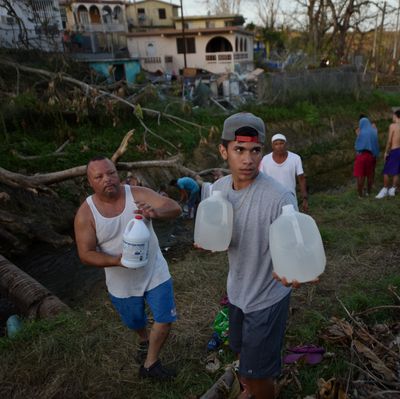
For days, those concerned about the plight of Puerto Rico, which was devastated by Hurricane Maria last week, have complained that President Trump remained silent about the crisis, but had time to pick a fight with the NFL. On Monday night, Trump finally weighed in — between more tweets attacking football players and Senator John McCain — and they instantly wished that he hadn’t.
It’s true that Puerto Rico’s infrastructure was in bad shape before the storm hit, thanks to a lack of maintenance related to the island’s $73 billion debt crisis. But Trump did not respond to Harvey by noting that experts warned for decades that Houston was a flooding disaster waiting to happen.
It seems Trump’s primary goal was to deflect accusations that his administration isn’t doing enough to help Puerto Rico’s 3.5 million American citizens, even as the situation threatens to become far worse. Maria was nearly a Category 5 storm when it swept across Puerto Rico, knocking out power on the entire island. The lack of power — which could take months to restore — plus damage to roads, ports, airports, and communications systems, have left Puerto Ricans in dire straits. Many are running out of food, water, and fuel, and have no way to reach out for help.
“Puerto Rico, which is part of the United States, can turn into a humanitarian crisis,” Governor Ricardo Rosselló said. “To avoid that, recognize that we Puerto Ricans are American citizens; when we speak of a catastrophe, everyone must be treated equally.”
Democrats and even some Republicans have called on the White House to step up its response. House Minority Leader Nancy Pelosi said it “must act immediately to make available additional Department of Defense resources for search-and-rescue operations, law enforcement and transportation needs.”
Congress is expected to address further funding for victims of Harvey, Irma, and Maria in the coming weeks, but party leaders said on Monday that they’re waiting for a formal disaster request from the Trump administration.
On Monday, a bipartisan group of four lawmakers, including Puerto Rico’s non-voting representative Jenniffer González-Colón, called on the Trump administration to establish a new federal entity to oversee the island’s storm recovery and it’s long-term economic problems. On Monday, Puerto Rico’s government asked the court for a four-week extension to meet key deadlines in its bankruptcy case, and others have said that what the nation really needs is a rollback of the outdated Jones Act that keeps its cost of living and its unemployment rate high.
Various administration officials pushed back against claims that Puerto Rico is being neglected. Brock Long, who heads the Federal Emergency Management Agency, and Tom Bossert, Trump’s Homeland Security Adviser, visited Puerto Rico on Monday to assess the damage. Long said there are 10,000 federal government employees “working around the clock” to address the situation, and the current problem isn’t money, but logistics. Per the New York Times:
San Juan airport’s airfield is damaged. And while six ports have opened, most are operating on a limited basis. Many roads remain cluttered with debris, and bridges must be checked. Getting around and finding housing for federal workers remains a challenge. And supplies and workers can’t just roll in on convoys from the next state over. The nearest state to Puerto Rico is more than 1,000 miles away by sea.
Representative Adam Smith, the top Democrat on the Armed Services Committee, said the military should be doing more to address those challenges. “The Trump administration’s response to the destruction in Puerto Rico has been wholly inadequate,” he said in a statement. “A territory of 3.5 million American citizens is almost completely without power, water, food, and telephone service, and we have a handful of helicopters involved in DOD’s response. It’s a disgrace. At a minimum, President Trump needs to assemble a coordinated military effort headed by a three-star general officer, as President Bush did after Hurricane Katrina.”
There are more than just a few helicopters assisting with relief efforts. Thirteen Coast Guard ships were sent to the area, along with three Navy amphibious ships — but as the Washington Post notes, that’s a “modest fleet” considering the scale of the disaster. When pressed on why the USS Abraham Lincoln, an aircraft carrier, and the USNS Comfort, a Navy hospital ship with 1,000 beds, are still sitting in Norfolk, Virginia, Thomas LaCrosse, the Pentagon’s director of defense support to civil authorities said, “We have great capability, but we cannot send it unless the state — or in this case territorial — government asks for it.”
Slate argued that there are other ways the military could be doing more, such as sending in Army engineers to reopen roads, logistics units to dispense supplies, and military police to assist local law enforcement — “but doing so would require political will, and require enormous bureaucratic and fiscal resources, to execute.”
Trump’s failure to order that kind of robust storm response doesn’t make sense, and not just because Puerto Ricans are Americans deserving of assistance. A Gallup poll found 51 percent of Americans approved of Trump’s Harvey response, and his job-approval rating has increased slightly in recent weeks. Why pass up an opportunity to demonstrate your ability to mobilize the federal government on an issue that has bipartisan support?






























